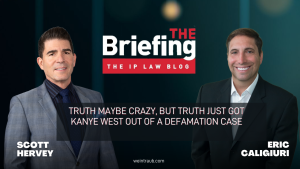Podcast: Play in new window | Download

Discover how truth became the ultimate defense in the legal battle between Cynthia Love and Kanye West. Join Scott Hervey and Eric Caligiuri from Weintraub Tobin as they unpack the court’s ruling on whether displaying historical footage amounts to defamation on this episode of ‘The Briefing’.
Watch this episode on the Weintraub YouTube channel here.
Show Notes:
Scott:
Truth is a defense to a defamation claim. So, it would be no surprise to think that displaying a recording of the way someone actually behaved at some past date would also not be defamation. That assumption was put on trial, literally, in the case of Cynthia Love versus Kanye West in the Central District of Illinois. I’m Scott Hervey from Weintraub Tobin, and I’m joined today by Weintraub lawyer and frequent guest of “The Briefing,” Eric Caligiuri, to talk about this case and the court’s ruling on today’s episode of “The Briefing.”
Eric, welcome back to “The Briefing.”
Eric:
Good to be here again, Scott. So, Scott, can you tell us a little bit about the history of the case?
Scott:
Sure. Absolutely. So, in 2003, Cynthia Love appeared in a Kanye West music video for “Talking Through The Wire.” Love apparently does some short dance number in a barbecue restaurant before asking West for some change. She, according to the complaint and according to the court documents, she looks unsteady and sounds slurred. Fast forward to 2022, when Netflix released a docuseries called “Jeen-yuhs,” a Kanye trilogy, which included clips of Love from that music video, plus previously unreleased footage, all totaling about two minutes of screen time. Love took issue with how she was portrayed in the clips taken in that barbecue restaurant decades ago, and so she sued.
Eric:
The basis of her claim is that the documentary captures Love at her darkest moments, and that is not who she is now. Love bases her defamation claims on the grounds that she is not the same person now that she was in 2003 when they made the music video.
Scott:
That’s right, Eric. That’s the basis of her complaint for defamation, false light, and other causes of action. On the defendant’s motion to dismiss, the court analyzed Love’s defamation claim. Now, under Illinois law, to state a defamation claim, a plaintiff must present facts showing that the defendant made a false statement about the plaintiff, that the defendant made an unprivileged publication of that statement to a third party, and that this publication caused damages.
Eric:
Similar to California law, in Illinois, truth is an absolute defense to defamation. True statements cannot support a defamation claim.
Scott:
That’s correct. And the court found that any allegations about Love in the “Jeen-yuhs” docuseries were true. The docuseries included real-world, real-life clips of Love without doctoring the content or adding any false material. It shows true clips of a real event. The court noted that the docuseries makes clear that the footage is from 20 years ago, and the fact that Love later turned things around does not make the footage from years earlier false.
Eric:
So, a defamation claim fails if the allegedly defamatory statement is a historical truth, even if it’s not necessarily the current truth.
Scott:
That’s right. If a defamatory statement is a historical truth, even if it’s not currently true, it’s true, and the defamation claim must fail. The “Jeen-yuhs” video accurately portrayed Love in a moment of time several decades ago. The video does not suggest that Love in this day remains in an intoxicated state or anything of that sort. The video shows a past truth without suggesting that the past is the present. The footage is historically accurate. So Love’s defamation claim and false like claim fail.
Eric:
There were other claims, too. A violation of publicity rights and intentional infliction of emotional distress.
Scott:
That’s right, and the court made short work of the right of publicity case, finding that the exemption for audiovisual works under the Illinois right of publicity law covered the docuseries. And as for the intentional infliction of emotional distress, the court had this to say, “A lighthearted dance by some barbecue is not extreme or outrageous. If anything, dancing while a little intoxicated near some barbecue is an all-American activity. It sounds like the 4th of July, lots of viewers might think, been there, done that.” As an aside, kudos to Justice Steven Seeger for the United States District Court for the Northern District of Illinois, the Eastern Division, for writing quite a pithy order.
Eric:
Scott, you work with a lot of production companies. Does this case surprise you at all?
Scott:
The ruling didn’t surprise me. Given that truth is a complete defense to a defamation claim, it is important for producers to understand that the reason the defamation case was dismissed is due in large part to the fact that the producers didn’t try to apply the footage out of context or otherwise manipulate matters to give an inaccurate impression. If the producers used the footage in a manner to imply that the footage was of a recent event, or that Love hadn’t changed her mannerisms from 20 years ago, the results might have been much different.
Eric:
Thanks, Scott. That was a really interesting case. Thanks for bringing that to our attention.
Scott:
Thank you for listening to this episode of “The Briefing.” We hope you enjoyed this episode. If you did, please remember to subscribe, leave us a review and share this episode with your friends and colleagues, and if you have any questions about the topics we covered today, please leave us a comment.